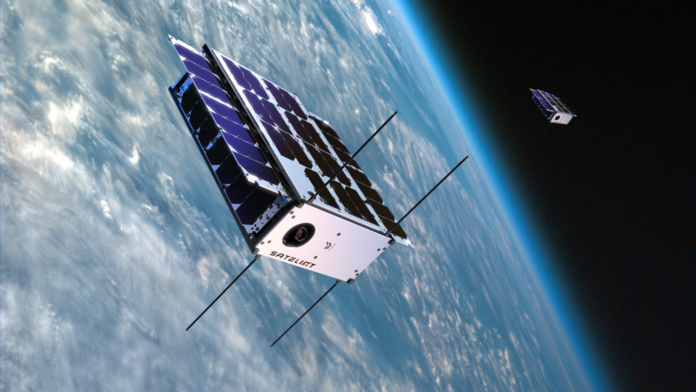Satellite IoT provider Sateliot is to launch four new NB-IoT satellites into low-Earth orbit (LEO). It is working with German firm Exolaunch, on the launch, scheduled on the Transporter-11 Rideshare mission with SpaceX in “mid-2024”. Exolaunch, which makes satellite separation systems, has been involved in 390 satellite launches on 26 flights. Sateliot has also announced a deal with ground station operator Leaf Space, to use its global network of 23 ground stations for redundancy and support. Leaf Space’s ground network supports 100-odd satellites, currently.
Spanish firm Sateliot, building an NB-IoT satellite system based on Release 17 specs in the 5G NR cellular standard, wants an LEO constellation of 250 satellites to patch up remote coverage black-spots around the world that are not currently served by terrestrial IoT networks. It launched its first NB-IoT satellites in early 2023. The firm has a virtualized cloud-native 5G core for its NB-IoT satellite service, courtesy of a deal with AWS, signed towards the back-end of 2022. It has emerged as a notable entrant in a busy satellite IoT market.
Sateliot’s four 6U satellites (named Sateliot_1 through _4) will be launched with help from Exolaunch, which is providing “mission management services and integration support”, including its “containerized” satellite separation system, EXOpod Nova, for their LEO deployment. Pablo Lobo, mission manager at Exolaunch, stated:. “With the launch campaign underway, our team’s excitement… is palpable. We look forward to a smooth and successful deployment of these satellites later this year.”
The deal with Italy-based Leaf Space will see the Barcelona-based firm use Leaf Space’s ground network (ground segment as-a-service) as a “5G point of presence” to allow switching between terrestrial and satellite networks with unmodified commercial NB-IoT devices, and to provide “efficieny” scalability and “robust support”. The new satellites will make first contact using Leaf Space’s “in-orbit check-in service” during the launch and early orbit phase (LEOP). “This ensures reliable communication from deployment,” said a statement.
Jonata Puglia, chief executive at Leaf Space, said: “Our global network is performing at its full potential and is ready to support satellites during the upcoming Transporter-11 launch and the commencement of their IoT services.” Sateliot said of its partnership with Leaf Space, which might also be applied to its arrangement with Exolaunch, that the deal “underscores the strength of the European space ecosystem”.
Sateliot, founded in 2018, wants to wholesale satellite NB-IoT as a roaming extension for terrestrial operators. Telefonica has been trialling the service. It is also going direct to specialist industrial solution providers. It has a deal with Swedish power grid firm Sentrisense to use satellite IoT service for electric grid sensors. It has another contract with freight software and analytics company t42 to deploy “thousands of 5G-IoT sensors” in shipping containers for “more than 50 logistics partners across over 50 countries”. Sateliot has offices in Barcelona and San Diego.
It claims a sales pipeline of more than €1 billion, and “endless possibilities in the untapped market of massive IoT in remote areas”. Jaume Sanpera, chief executive officer at Sateliot, said: “With Exolaunch’s expertise and industry-leading services, we are confident in the successful launch and deployment of our next four satellites, further advancing our vision of ubiquitous IoT connectivity… [With Leaf Space] we are demonstrating end-to-end services that ensure seamless global IoT connectivity, showcasing the power of collaboration and technological advancement within our industry.”
Meanwhile, France-based satellite IoT startup Kinéis has said its launch of five nanosatellites from a launchpad in New Zealand on June 18 went off without a hitch. New Zealand-based Rocket Lab, which has been launching satellites on its Electron vehicle since 2017, handled the launch, also on a SpaceX shuttle – its fiftieth to date on the Electron launcher. Alexandre Tisserant, chairman at Kinéis, said: “The delicate phase of separating our five nanosatellites from the launcher went very well. Our teams are now working to place them in their respective orbits.”
Kinéis will launch 25 new satellites in five batches of five, over eight months through early 2025. Three further launches are scheduled for before the end of 2024; a final launch will take place in the first quarter of 2025. Each LEO satellite weighs 30 kilograms, and is set to operate at an altitude of 650 kilometres. Preliminary tests will be carried out through the end of 2024; Kineis wants a commercial service in 2025, it said. It has approval from the Federal Communications Commission (FCC) to operate in the US market.
In May, it announced a deal with Semtech to offer native satellite support in the California firm’s LR1110 and LR1120 LoRa Edge chips. It also has a legacy deal with Sigfox owner Unabiz. The company lists a range of customer sectors: transportation and logistics, oil and gas, agriculture, environmental monitoring, and energy and utilities.

